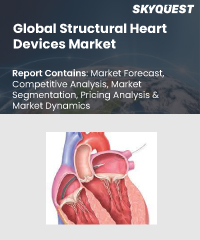
Report ID: SQMIG35G2184

Report ID:
SQMIG35G2184 |
Region:
Global |
Published Date: October, 2024
Pages:
157
|
Tables:
34 |
Figures:
74
Structural Heart Devices Market size was valued at USD 11.97 Billion in 2023 and is poised to grow from USD 13.1 Billion in 2024 to USD 26.89 Billion by 2032, growing at a CAGR of 9.4% during the forecast period (2025-2032).
High prevalence of targeted diseases is the key driver of the structural heart devices market growth. About 60 million people in the U.S. have systemic flaws at their heart. This is 20-25% of the country’s adult population. This shows how great these devices are in preventing cardiac system defects. Treatment of systemic heart disease (SHD) includes a wide range of percutaneous therapies for patients with acquired heart disease and congenital heart disease (CHD) involving the heart chamber, proximal great vessels, and myocardial infarction.
Costs in the U.S. are expected to be $1.5 billion will be much better in the coming years, so procedures like TAVR (Transcatheter Aortic Valve Replacement) will become more affordable as the target population ages and pays for treatment at the Centers for Medicare and Medicaid Services (CMS). It reduces healthcare costs, thus encouraging more people to opt for these treatments. This is a positive factor for a positive effect on procedures such as left atrial appendicectomy (LAAC), which is useful for reducing the risk of stroke. Industry players invest heavily in R&D programs to come up with effective products and compete in the structural heart devices industry. For example, Medtronic, Boston Scientific, Abbott and Edwards Lifesciences represented several organizations and released updates on their heart offerings at the 34th Transcatheter Cardiac Therapy (TCT) Conference in September 2022 in Boston.
US Structural Heart Devices Market is poised to grow at a sustainable CAGR for the next forecast year.
Our industry expert will work with you to provide you with customized data in a short amount of time.
REQUEST FREE CUSTOMIZATIONWant to customize this report? This report can be personalized according to your needs. Our analysts and industry experts will work directly with you to understand your requirements and provide you with customized data in a short amount of time. We offer $1000 worth of FREE customization at the time of purchase.

Report ID: SQMIG35G2184